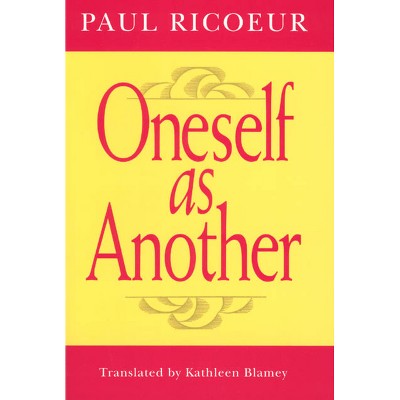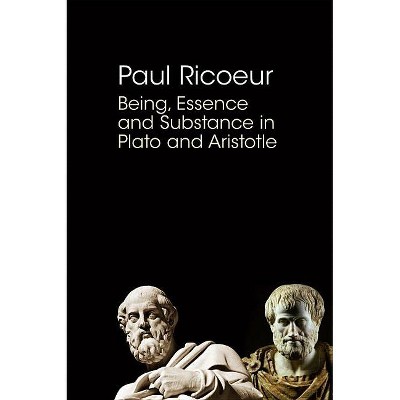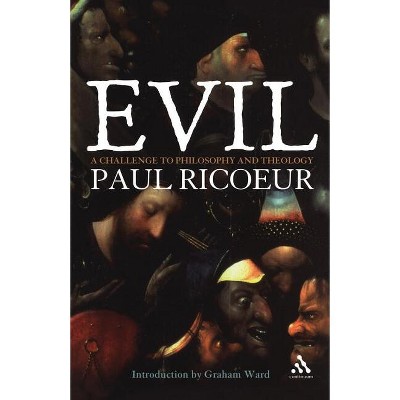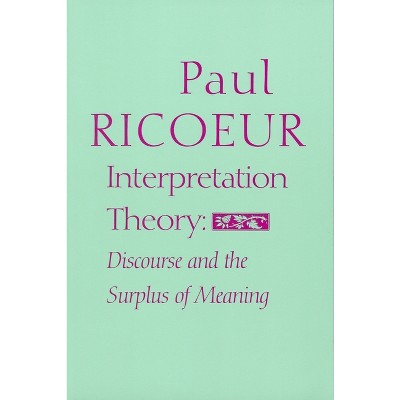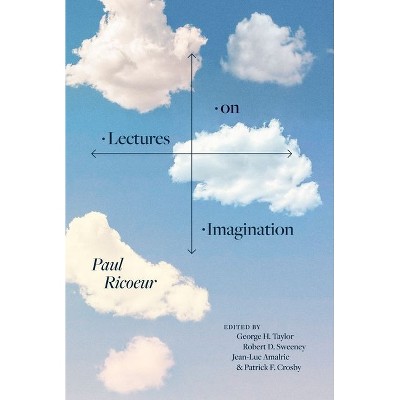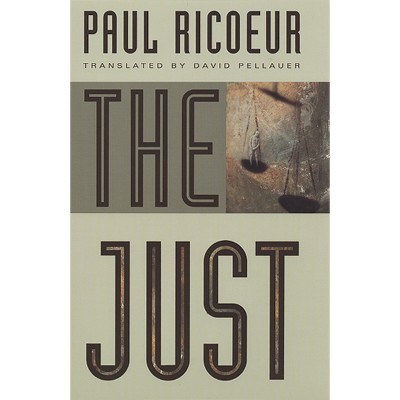Sponsored

Memory, History, Forgetting - by Paul Ricoeur (Paperback)
In Stock
Sponsored
About this item
Highlights
- A landmark work by a philosopher whom the New York Times said writes the best kind of philosophy--critical, economical, and clear.
- About the Author: Paul Ricoeur is the John Nuveen Professor Emeritus in the Divinity School, the Department of Philosophy, and the Committee on Social Thought at the University of Chicago.
- 624 Pages
- Philosophy, History & Surveys
Description
Book Synopsis
A landmark work by a philosopher whom the New York Times said writes the best kind of philosophy--critical, economical, and clear." Why do major historical events such as the Holocaust occupy the forefront of the collective consciousness, while profound moments such as the Armenian genocide, the McCarthy era, and France's role in North Africa stand distantly behind? Is it possible that history "overly remembers" some events at the expense of others? A landmark work in philosophy, Paul Ricoeur's Memory, History, Forgetting examines this reciprocal relationship between remembering and forgetting, showing how it affects both the perception of historical experience and the production of historical narrative. Memory, History, Forgetting, like its title, is divided into three major sections. Ricoeur first takes a phenomenological approach to memory and mnemonical devices. The underlying question here is how a memory of present can be of something absent, the past. The second section addresses recent work by historians by reopening the question of the nature and truth of historical knowledge. Ricoeur explores whether historians, who can write a history of memory, can truly break with all dependence on memory, including memories that resist representation. The third and final section is a profound meditation on the necessity of forgetting as a condition for the possibility of remembering, and whether there can be something like happy forgetting in parallel to happy memory. Throughout the book there are careful and close readings of the texts of Aristotle and Plato, of Descartes and Kant, and of Halbwachs and Pierre Nora. A momentous achievement in the career of one of the most significant philosophers of our age, Memory, History, Forgetting provides the crucial link between Ricoeur's Time and Narrative and Oneself as Another and his recent reflections on ethics and the problems of responsibility and representation.From the Back Cover
Why do major historical events such as the Holocaust occupy the forefront of the collective consciousness, while profound moments such as the Armenian genocide, the McCarthy era, and France's role in North Africa stand distantly behind? Is it possible that history "overly remembers" some events at the expense of others? A landmark work in philosophy, Paul Ricoeur's Memory, History, Forgetting examines this reciprocal relationship between remembering and forgetting, showing how it affects both the perception of historical experience and the production of historical narrative. Memory, History, Forgetting, like its title, is divided into three major sections. Ricoeur first takes a phenomenological approach to memory and mnemonical devices. The underlying question here is how a memory of present can be of something absent, the past. The second section addresses recent work by historians by reopening the question of the nature and truth of historical knowledge. Ricoeur explores whether historians, who can write a history of memory, can truly break with all dependence on memory, including memories that resist representation. The third and final section is a profound meditation on the necessity of forgetting as a condition for the possibility of remembering, and whether there can be something like happy forgetting in parallel to happy memory. Throughout the book there are careful and close readings of the texts of Aristotle and Plato, of Descartes and Kant, and of Halbwachs and Pierre Nora. A momentous achievement in the career of one of the most significant philosophers of our age, Memory, History, Forgetting provides the crucial link between Ricoeur's Time and Narrative and Oneself as Another and his recent reflections on ethics and the problems of responsibility and representation.Review Quotes
"Memory, History, Forgetting is not an easygoing work, and many will doubt its direct relevance to the working practices of historians and social sciences, viewing it rather as an esoteric discussion for philosophers. This would be to neglect an important piece of reflective thinking on the nature of historiographical problems."
--Paul Jackson "Totalitarian Movements and Politcal Religions""Paul Ricoeur's book Memory, History, Forgetting, is without a doubt a vital contribution albeit one that fits into a particular mould, namely that of a heavyweight Gallic intellectual in the time honoured tradition of Jean-Paul Sartre, Michel Foucault, and Jacques Derrida. . . . This is one of the most thought-provoking books I have read for some time. . . . From the outset Ricoeur displays a breathtaking array of learning with careful and close readings of Saint Augustine, Aristotle, Plato, Descartes, and Kant. . . . [This book] ranks as a momentous achievement which deserves a wide audience in the English speaking world."
--Martin Evans "History Today" (5/1/2005 12:00:00 AM)"Memory, History, Forgetting is an exceedingly serious study: serious in the . . . sense of being thoughtful, thorough, with a good sense of what is important."--Times Literary Supplement
--Avishai Margalit "Times Literary Supplement" (9/30/2005 12:00:00 AM)
"Moving. . . . it provides strong ethical advice for today as official commemoration brings the memory of some European genocides to the fore while maintaining a persistent silence on others. Ricoeur's closing words on the link between amnesty and amnesia are the legacy we can take from this book. The boundary between the two can be preserved, he writes, through the work of memory, complemented by the work of mourning, invoking a type of forgetting understood not as silence but as a statement in a pacified mood, without anger -- an enunciation to be understood not as a commandment, but as a wish."--Luisa Passerini "The Times Higher Education Supplmenet" (10/21/2005 12:00:00 AM)
"Ricoeur labors as an incomparable mediator of often estranged philosophical approaches, always in a manner that compromises neither rigor nor creativity." -- "Christian Century"
"Ricoeur unpacks and explores the theoretical junctions and disjunctions through which both philosophers and the public have moved as they contemplate and re-experience major ethical events that shape the individual's self-perception and form the evolving identity of culture. Ricoeur's style here is both leisurely and comprehensive, opening up each new avenue of theory by explaining which philosophic tenets and texts inform his narrative. His success in revealing the internal relations between recalling and forgetting, and how this dynamic becomes problematic in light of events once present but now past, will inspire academic dialogue and response but also holds great appeal to educated general readers in search of both method for and insight from considering the ethical ramifications of modern events. The epilog turns to the subject of forgiveness, that "horizon common to memory, history and forgetting," and thus out from the self to the world again. Originally published in France in 2000, this work has won various literary and scholarly prizes. It is indeed a master work, not only in Ricoeur's own vita but also in contemporary European philosophy."--Francisca Goldsmith "Library Journal" (11/1/2004 12:00:00 AM)
"Ricoeur writes the best kind of philosophy--critical, economical, and clear."-- "New York Times Book Review"
"There is always something more to be discovered in a text by Paul Ricoeur." -- "Journal of Literature and Theology"
"This Ricoeur masterpiece is really three independent, closely related books: a phenomenology of memory, an epistemology of the historical sciences, and a hermeneutics of forgetting." -- "Choice"
About the Author
Paul Ricoeur is the John Nuveen Professor Emeritus in the Divinity School, the Department of Philosophy, and the Committee on Social Thought at the University of Chicago. He is the author of many books including Oneself as Another, the three-volume Time and Narrative, and The Just, all published by the University of Chicago Press. Kathleen Blamey has taught philosophy at California State University, Hayward, and the American University in Paris. David Pellauer is a professor of philosophy at DePaul University.Shipping details
Return details
Trending Philosophy












